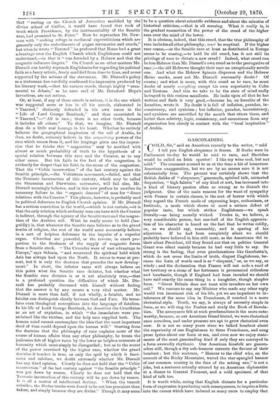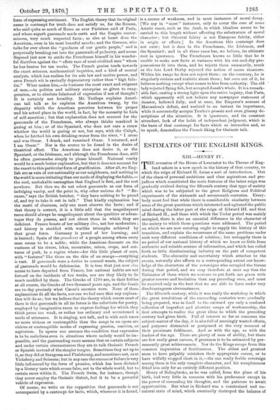GASCONADING.
"C OLD, Sir," said an American recently to the writer, cold I tell you English eloquence is frozen. If Burke were in Parliament to-day he would be said to rave, and Sheridan would be called an Irish spouter l I like my wine cool, but not solid." The comment seemed to us at the time a bit of humorous American exaggeration, but we are by no means sure it is not substantially true. The present war certainly shows that the British dislike of " eloquence," gasconade, spirited talk, animated despatches, " high falutin " of any kind or sort, has increased into, a kind of literary passion often so strong as to disturb the judgment. One of the main reasons for the want of sympathy with France in certain classes, is the sort of horror with which they regard the French mode of expressing hope, enthusiasm, or fortitude, a mode which shows at most a serious defect of popular taste, but which strikes Englishmen—we speak literally—as being morally wicked. Trochu is, we believe, a very considerable person, but one-half of the English apprecia- tion of his character is based on the fact that he writes coldly,. or, as we should say, reasonably, and is sparing of his- adjectives. If he had been completely silent we should probably have believed in him still more, as the Americans did in their silent President, till they found out that on politics General Grant was silent mainly because he had very little to say. So strong is the feeling, that even proclamations like Gambetta's4 which do not cross the limits of truth, disgust Englishmen, be- cause the form of words used is so " eloquent," or, as we say, so windy ; and the declaration that France will not cede a rood of her territory or a stone of her fortresses is pronounced ridiculou.. and bombastic, though if England had been invaded we should have said exactly the same thing in a haughtier, though simpler form. " Great Britain does not treat with invaders on her own soil." We venture to say any Minister who made any other reply would run imminent risk of his life, yet we are impatient to in- tolerance of the same idea in Frenchmen, if couched in a more rhetorical style. Truth, we say, is always of necessity simple in form, so we will sing the Psalms and study the Book of Revela- tion. The annoyance felt at such proclamations is the more note- worthy, because, as our American friend hinted, we were rhetorical once ourselves, and under pressure are apt to grow rhetorical even. now. It is not so many years since we talked bombast about the superiority of one Englishman to three Frenchmen, and sung prose lyrics about our feats at sea, and even now we enjoy state- ments of the most gasconading kind if only they are conveyed in a form avowedly rhythmic. Our American kinsfolk are gascon, aders still, though a dry sub-humour corrects the flavour of their bombast ; but this sentence, " Honour to the chief who, on the summit of the Rocky Mountains, waved the star-spangled banner of our common country in the face of the setting sun," is not a joke, but a sentence actually uttered by an American diplomatist at a dinner to General Fremont, and a mild specimen of that kind of talk too.
It is worth while, seeing that English distaste for a particular- form of expression is producing such consequences, to inquire a little into the causes which have induced so many races to employ that
form of expressing sentiment. The English theory that its original cause is contempt for truth does not satisfy us, for the Roman, who said quite as much of Rome as ever Parisians said of Paris, and whose superb gasconade made earth and the Empire conter- minous, very much respected facts ; as also at heart does the American, even in his most boastful moods; and the German, who talks for ever about the "goodness of our gentle people," and is perpetually breaking out into the gasconade of pedantry, and seems disposed just now to outdo the Frenchman himself in his wonder- ful diatribes against the " effete race of semi-civilized men" whom he has beaten for ten weeks. The French genius tends towards the exact sciences, mathematical• inquiries, and a kind of mental analysis, which has realism for its sole law and motive power, and even French wit is cynically depreciatory rather than " high falu- tin." What makes him,—in business the most exact and exigeant of men,—in politics and military enterprise so given to exag- geration, or to absolute falsehood of expression if not of thought? It is certainly not humility. Mr. Trollope explains Ameri- can tall talk as he explains the American twang, by the disparity which the American perceives between his proper and his actual place in the world, in fact, by the necessity he feels of self-assertion ; but that explanation does not account for the gasconade of the Frenchman, who always thinks mankind is gazing at him ; or of the Spaniard, who does not care a straw whether the world is gazing or not, but says, with the Caliph, when he fetched his own drinking-water from the river, " I arose and was Omar. I drank, and remained Omar. 1 returned, and I am Omar." Nor is the source to be found in the desire of theatrical effect. The American does not desire it, or the Spaniard, or the Irishman, and although the Frenchman does, still he often gasconades simply to please himself. National vanity would be a much better explanation, but that it does not account for the resort to this particular form of gratification. After all, we Eng- lish are as vain of our nationality as our neighbours, and nothing in the world is more irritating than our mode of displaying the foible,— the cool, unshakable assumption that England is first, and the rest nowhere. But then we do not select gasconade as our form of indulging vanity, and the point is, why other nations do ? " Be- cause," says the British butcher, " they have nothing to be proud of, and try to take it out in talk." That kindly explanation has the merit of clearness, only one must observe the facts ; and if that theory is correct, it is a little odd that the magniloquent races should always be magniloquent about the qualities or advan- tages they do possess, and not about those in which they are deficient. France boasts of her military élan, not her moderation ; and history is studded with warlike triumphs achieved by that great force. Germany is proud of her learning, and is learned ; Spain of the grandezza of a people among whom every man seems to be a noble ; while the American descants on the vastness of his rivers, lakes, mountains, mines, crops, and out- turns of pork, in a region where—for this little planet of ours, with "features" like those on the skin of an orange—everything is vast. If gasconade were a device to conceal wants, the subject of gasconade would be deficiencies. It is true that just now elan seems to have departed from France, but national habits are not formed on the incidents of ten weeks, nor are they likely to be much modified by them. The Greeks of 1790 are, in their foibles at all events, the Greeks of two thousand years ago, and the Gauls are to-day precisely what Caesar's enemies were. None of these explanations fit all the facts, nor can we feel sure that any explana- tion will do so ; but we believe that the theory which covers most of them is that gasconade in all its forms is the substitute for poetry, employed by imaginative races to express feelings for which they think prose too weak, or rather too ordinary and accustomed a mode of utterance. It is singing, not talk, and is with such races no more vicious or contemptible than the songs in an opera are vicious or contemptible modes of expressing passion, emotion, or aspiration. In operas one assumes the condition that expression is to be melodious even in situations where melody would be im- possible, and the gasconading races assume that on certain subjects and under certain circumstances they are to talk Ossianic French or Spanish instead of the simpler tongue. Sometimes they act up to it, as they did at Saragossa and Phalsbourg, and sometimes not, as at Vicksburg and Soissons; but in any case the success or failure is very little influenced by the form of promise, which has been dictated by a literary taste which seems false, not to the whole world, but to certain races within it. The French Swiss, for instance, though they never employ the Ossianic dialect, feel it to be a powerful vehicle of expression.
Of course, we write on the supposition that gasconade is not accompanied by a contempt for facts, which, wherever it is found,
is a source of weakness, and in most instances of moral decay. [We say in " most" instances, only to cover the case of some Asiatic races, such as the Arab. in which idealism seems to be carried to this length without affecting the substratum of moral character ; but Oriental falsity is not European falsity, either in origin or effects.] In the American this contempt does not exist ; but it does in the Frenchman, the Irishman, and the Spaniard ; and in all three cases has, we believe, its ultimate root in ignorance. The Frenchman knows so little that he is unable to make new facts at variance with his cut-and-dry pre- possessions fit into them, and he rejects them summarily, much as the late Lord Derby rejected the notion of ocean steamers. Within his range he does not reject them ; on the contrary, he is singularly curious and realistic about them ; but once out of it, he believes nothing except what comes to him from authority. The old lady rejected flying fish, but accepted Jonah's whale. It is a remark- able fact, casting a strong light upon the entire inquiry, that Paris, which apparently will not believe any newspaper statement of disaster, believed fully, and at once, the Emperor's account of Macuiahon's defeat, and realized in an instant its importance, while it contentedly accepts Trochu's prosaic and even gloomy de- scriptions of the situation. It is ignorance, and its constant attendant, lack of the habit of independent judgment, which is the basis of that contempt for facts which so intensifies and, so to speak, demoralizes the French liking for Ossianic talk.



































 Previous page
Previous page